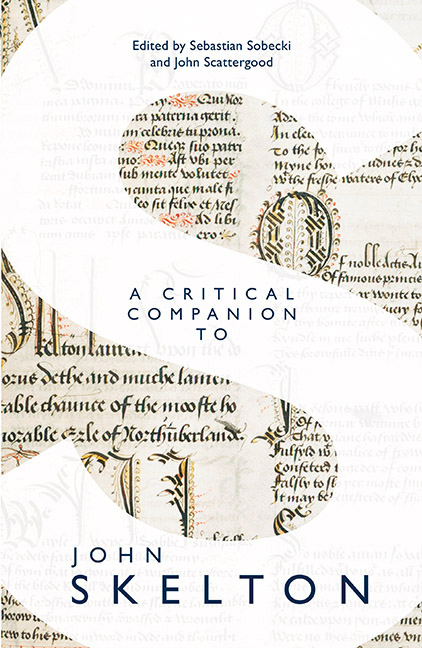Book contents
- Frontmatter
- Dedication
- Contents
- Acknowledgements
- Contributors
- Abbreviations
- Conventions
- Introduction
- 1 John Skelton (?1460–1529): A Life in Writing
- 2 Religion
- 3 Law and Politics
- 4 Classical Literature
- 5 Humanism
- 6 Satires and Invectives
- 7 Lyrics and Short Poems
- 8 Skelton's Voice and Performance
- 9 Literary Tradition
- 10 Skelton and the English Language
- 11 Skelton's English Works in Manuscripts and Print
- 12 Skelton's English Canon
- 13 Reception and Afterlife
- A Skelton Bibliography
- Index of Manuscripts
- Index of Printers and Stationers
- General Index
6 - Satires and Invectives
Published online by Cambridge University Press: 24 July 2019
- Frontmatter
- Dedication
- Contents
- Acknowledgements
- Contributors
- Abbreviations
- Conventions
- Introduction
- 1 John Skelton (?1460–1529): A Life in Writing
- 2 Religion
- 3 Law and Politics
- 4 Classical Literature
- 5 Humanism
- 6 Satires and Invectives
- 7 Lyrics and Short Poems
- 8 Skelton's Voice and Performance
- 9 Literary Tradition
- 10 Skelton and the English Language
- 11 Skelton's English Works in Manuscripts and Print
- 12 Skelton's English Canon
- 13 Reception and Afterlife
- A Skelton Bibliography
- Index of Manuscripts
- Index of Printers and Stationers
- General Index
Summary
According to one medieval treatise on the art of poetry, ‘all poetic utterance is either vituperation or praise’. Poets do not represent their subjects neutrally, but always either negatively (vituperatio) or positively (laudatio) (De Arte Poetica 1968: 41; Burrow 2008: 18–19). Dante says much the same when, in his De Vulgari Eloquentia, he describes the two kinds of subject worthy of poetic treatment. ‘On the right’, as he puts it, there belong those subjects where a poet will write persuasorie, gratulanter or laudabiliter – by way, that is, of encouragement, congratulation or praise. Subjects ‘on the left’, by contrast, require to be treated dissuasorie, yronice or contemptive – dissuasively, ironically or contemptuously (Dante 1996: II, xiv, 2). The great majority of Skelton's poems can readily be assigned to one or other of these two types, either laudatory or vituperative. His Lawde and Prayse Made for Our Sovereigne Lord the Kyng praises its subject effusively, as does the long ‘commendation’ of Jane Scrope in Phyllyp Sparowe, and he even devotes one piece, the Garlande of Laurell, to praising himself. Much more numerous, however, are the poems where he addresses his subjects contemptive. It is vituperatio rather than laudatio that prevails in Skelton's surviving English verse.
Scattergood's edition of the English poems numbers twenty-four items in all, and of these no fewer than fifteen belong on the left side of Dante's scheme (III (i and iv), V, VI, VIII, XI, XII, XIII, XIV, XV, XVI, XVIII, XIX, XX, XXIII, XIV). Two of these, The Bowge of Courte and Magnyfycence, will not be considered in this chapter, on the grounds that, although both the dream-poem and the moral play present many of their characters contemptive, neither can address its subjects directly in that first-person voice which distinguishes Skelton the satirist.
Some Latin verses at the end of Ware the Hauke are headed ‘On the Freedom of Poetic Utterance in Extolling Virtue and Exposing the Ignoble’. Here Skelton speaks of an ancient privilege (libertas veneranda) granted to God-fearing (pius) poets: they can ‘say whatever they please, whatever will give delight, and whatever will serve either to defend just causes or to attack stupid brutes’. Either way, poets enjoyed a particular licence to exaggerate their cases.
- Type
- Chapter
- Information
- A Critical Companion to John Skelton , pp. 88 - 101Publisher: Boydell & BrewerPrint publication year: 2018

